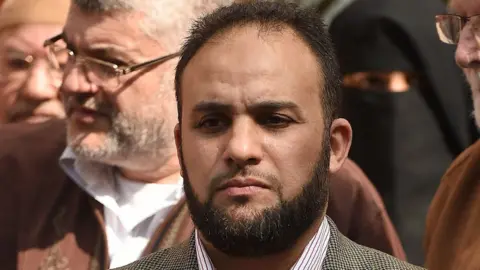Manchester mosque sermon 'called for armed jihad', say scholars
A sermon at the mosque where the Manchester bomber worshipped called for the support of armed jihadist fighters, according to two Muslim scholars.
An imam at Didsbury Mosque in December 2016 was recorded praying for "victory" for "our brothers and sisters right now in Aleppo and Syria and Iraq".
Scholars Usama Hasan and Shaykh Rehan said it referred to "military jihad".
The imam, Mustafa Graf, says his sermon did not call for armed jihad and he has never preached radical Islam.
The recording the BBC obtained is of Friday prayers at the mosque six months before Salman Abedi detonated a suicide bomb following an Ariana Grande concert at Manchester Arena in May 2017.
Abedi and his family regularly attended the mosque and his father sometimes led the call to prayer.
The family's whereabouts on the day of the sermon are unknown but the BBC has been told that Abedi bought a ticket for the concert 10 days later.
The bomb killed 22 people and the attacker, as well as injuring hundreds of others.
It is also understood at least five men who have attended Didsbury Mosque have either travelled to Syria or have been jailed for terrorism offences.
Greater Manchester Police said they had the BBC's material and were reviewing it "to establish if any criminal offences have been committed".
 Getty Images
Getty ImagesThe sermon, which was at a time of bombing in the Syrian city of Aleppo, includes prayers for "mujahideen" fighting abroad - a term commonly used for Islamist guerrilla fighters.
"We ask Allah to grant them mujahideen - our brothers and sisters right now in Aleppo and Syria and Iraq - to grant them victory," Mr Graf is heard saying.
Elsewhere it says: "Lots of brothers stayed behind unfortunately. They love Islam and Muslims but they do nothing for the support of their brothers and sisters."
Another passage says: "Jihad for the sake of Allah is the source of pride and dignity for this nation."
Mr Hasan, head of Islamic studies at Quilliam, a think tank that focuses on counter-extremism, said: "From the context and the way these texts [the religious passages quoted within the sermon] are used they are clearly referring to military jihad, to armed jihad.
"I have known the Islamic discourse for pretty much 40 years, from being a child in this country and worldwide, and the mujahideen are the group fighting armed jihad."
Mr Rehan said he was in no doubt about what the sermon meant.
"The jihad he's referring to here is actually being on the battlefield, there's no ifs and no buts in this."
The sermon centres on the suffering in Syria and includes an appeal for donations.
At one point Mr Graf is heard saying: "The whole world, including Europe, America - what is the so-called civilised world - is watching what is happening in Aleppo and Syria.
"They know that Iran, Russia and the militias are killing humans in Syria and they do nothing.
"Well in fact they helped the Russians and the Iranians and others, the militias, to kill Muslims over there."

What does jihad mean?
The word "jihad" is widely used, though often inaccurately, by Western politicians and media.
In Arabic, the word means "effort" or "struggle". In Islam, it could be an individual's internal struggle against baser instincts, the struggle to build a good Muslim society, or a war for the faith against unbelievers.

Mr Rehan said: "He's giving them the narrative of them against us. He is psychologically and practically brainwashing young people into either travelling or to do something to take action."
Connections between the preacher and Salman Abedi have also been uncovered.
The BBC has obtained footage of Abedi attending a demonstration in London against a secular Libyan general who was fighting against Islamist militia.
The event was organised by the so-called 17th of February Forum protest group. Mr Graf is a leader of the group, although he was not present at the London demonstration.
Mr Graf declined to be interviewed by the BBC but denied he had called for armed jihad or that he had ever preached Islamic extremism.
The trustees of Didsbury Mosque also said the five men understood to have travelled to Syria or jailed for terrorism offences had not visited the mosque.
In a statement it said Mr Graf's sermon was highlighting the plight of Syrians and his use of the words "jihad" and "mujahideen" had been misinterpreted.
"We do not tolerate or instigate any form of preaching that breaches both Islamic principles and the laws of England and Wales," it said.
